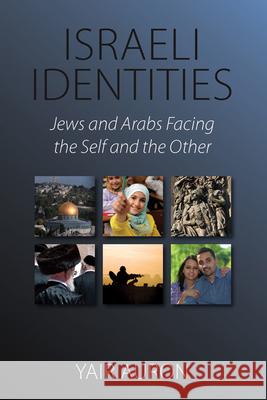Israeli Identities: Jews and Arabs Facing the Self and the Other » książka
Israeli Identities: Jews and Arabs Facing the Self and the Other
ISBN-13: 9781782387954 / Angielski / Miękka / 2015 / 300 str.
Israeli Identities: Jews and Arabs Facing the Self and the Other
ISBN-13: 9781782387954 / Angielski / Miękka / 2015 / 300 str.
(netto: 130,37 VAT: 5%)
Najniższa cena z 30 dni: 135,22
ok. 30 dni roboczych.
Darmowa dostawa!
"This is a very professional and empirical study on Israeli attitudes to both the Holocaust and the Naqba and their implications on the construction of present-day Israeli identities. The scholarship is sound and the methodology impressive." - Ilan Pappe, author of A History of Modern Palestine. One Land, Two People. The question of identity is one of present-day Israel's cardinal and most pressing issues. In a comprehensive examination of the identity issue, this study focuses on attitudes toward the Jewish people in Israel and the Diaspora; the Holocaust and its repercussions on identity; attitudes toward the state of Israel and Zionism; and attitudes toward Jewish religion. Israeli Arab students (Israeli Palestinians) and Jewish Israeli students were asked corresponding questions regarding their identity. It was found that, rather than lessening its impact over the years, the Holocaust has become a major factor, at times the paramount factor in Jewish identity. Similarly, among Palestinians the Naqba has become a major factor in Palestinian-Israeli identity. However, the overall results show that the identity of a Jewish citizen of Israel is not purely Israeli, nor is it purely Jewish. It is, to varying degrees, a synthesis of Jewish and Israeli components, depending on the particular sub-groups or sub-identities. The same holds for Israeli-Arabs or Israeli-Palestinians who have neither a purely Israeli identity nor a purely Palestinian (or Arab) one. Yair Auron is a professor of genocide and contemporary Judaism at the Open University of Israel and the Kibbutzim College of Education. He has published numerous books and essays, mainly on genocide and on Jewish identity in Israel and Europe, including most recently, The Banality of Indifference: Zionism and the Armenian Genocide (2000), The Banality of Denial: Israel and the Armenian Genocide (2003), Genocide Reflections on the Inconceivable: Theoretical Aspects in Genocide Studied (2007), A Perfect Injustice: Genocide and the Armenian Theft (2009, with Hrayr S. Karagueuzian) and Genocide -So That I Wouldn't Be Among the Silent (2011).
"This is a very professional and empirical study on Israeli attitudes to both the Holocaust and the Naqba and their implications on the construction of present-day Israeli identities. The scholarship is sound and the methodology impressive." · Ilan Pappé, author of A History of Modern Palestine. One Land, Two People.
The question of identity is one of present-day Israels cardinal and most pressing issues. In a comprehensive examination of the identity issue, this study focuses on attitudes toward the Jewish people in Israel and the Diaspora; the Holocaust and its repercussions on identity; attitudes toward the state of Israel and Zionism; and attitudes toward Jewish religion. Israeli Arab students (Israeli Palestinians) and Jewish Israeli students were asked corresponding questions regarding their identity. It was found that, rather than lessening its impact over the years, the Holocaust has become a major factor, at times the paramount factor in Jewish identity. Similarly, among Palestinians the Naqba has become a major factor in Palestinian-Israeli identity. However, the overall results show that the identity of a Jewish citizen of Israel is not purely Israeli, nor is it purely Jewish. It is, to varying degrees, a synthesis of Jewish and Israeli components, depending on the particular sub-groups or sub-identities. The same holds for Israeli-Arabs or Israeli-Palestinians who have neither a purely Israeli identity nor a purely Palestinian (or Arab) one.
Yair Auron is a professor of genocide and contemporary Judaism at the Open University of Israel and the Kibbutzim College of Education. He has published numerous books and essays, mainly on genocide and on Jewish identity in Israel and Europe, including most recently, The Banality of Indifference: Zionism and the Armenian Genocide (2000), The Banality of Denial: Israel and the Armenian Genocide (2003), Genocide Reflections on the Inconceivable: Theoretical Aspects in Genocide Studied (2007), A Perfect Injustice: Genocide and the Armenian Theft (2009, with Hrayr S. Karagueuzian) and Genocide So That I Wouldnt Be Among the Silent (2011).











